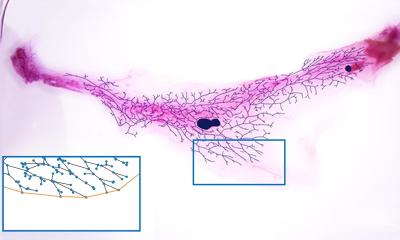News • Triple-negative breast cancer
Target validation for drug development against aggressive breast cancer
At around 30.5 percent, breast cancer is the most common cancer among women in countries of the industrialized world. The number of cases has doubled since the 1980s: about 69,000 times a year women are diagnosed with breast cancer.

Graphic: Kerstin Wagner / FLI; Source: Pixabay
Triple-negative breast cancer is a particularly aggressive form of breast cancer. As important receptors are missing here, treatment options and prognosis for such tumors are very poor.
Researchers around Dr. Björn von Eyss, junior group leader at the Leibniz Institute on Aging – Fritz Lipmann Institute (FLI) in Jena, Germany, reported 2018 in their study in Nature Communications that the protein TRPS1 (Trichorhinophalangeal Syndrome 1) plays an important role in such tumors. They showed that TRPS1 is increased in tumors, as they occur in triple-negative breast cancer, and found out that a downregulation of TRPS1 results in better survival prognosis of breast cancer patients.
Independent studies in Harvard and at Novartis confirmed, that a decrease of TRPS1 inhibits cell division in other cell types. This shows that TRPS1 could be a promising new drug target in breast cancer. It is hypothesized that new therapeutics for inhibiting this protein would have few side effects on the body, because TRPS1 mainly occurs in cells of breast tissue.
Dr. von Eyss pursued this potential therapeutic approach at FLI and got support by the internal SPARK@FLI program to continue his research for two more years. SPARK@FLI supports researchers to develop their results from basic biomedical research towards possible applications in therapeutics or diagnostics, bringing them from bench to bedside. Thus, research at FLI can contribute to a better health of our society. “The first important step towards drug development was the development of a mouse model to investigate the newly discovered mechanism of TRPS1 regulation”, says Dr. von Eyss about his research. “With the newly launched project funded by the BMBF, we can continue our research and further work on the validation of targets for the development of pharmaceutical drugs”, he further explains. The project “Targeting TRPS1 in breast cancer” is funded by the Federal Ministry of Education and Research (BMBF) for the next two years with 832K Euro. The researchers aim at finding highly effective tailor-made therapies for the inhibition of this novel oncogene, which can be applied in future for the treatment of triple-negative breast cancer.
Recommended article

Article • Evolution of technology
The value of AI in breast screening
Although breast cancer (BC) mammography screening enables early detection of breast cancer, mammography presents issues such as variability between the radiology readings and shortage of radiologists. This area of medical imaging is where artificial intelligence (AI) could help make the biggest difference and improve patient outcome.
The researchers use high-throughput screening for target validation to identify chemical substances that successfully inhibit the TRPS1 protein. The team is supported by Prof. Dr. Hans-Dieter Arndt from the Institute of Organic Chemistry and Macromolecular Chemistry at the Friedrich Schiller University Jena (FSU), an expert in the synthesis and design of peptide and non-peptide natural products. His research group at FSU, will study how to improve the biological activity of the newly discovered inhibitors.
External industry mentor Dr. Hélène Chéry Hernandez complements the existing expertise of this project team. She will contribute to the implementation of guidelines for industry-based target validation in academic research. “This will significantly increase the chances of success of this project”, says Dr. Sonja Schätzlein, coordinator of the SPARK@FLI program, who accompanies the research project from the idea to its implementation. “The advice of our industry advisors was just as crucial to the development process as the seed-funding from the SPARK@FLI Program.”
BMBF funding is provided under the federal “Health Research” framework program in the guideline for funding of projects on "Target validation for pharmaceutical drug development" and is part of the “National Drug Initiative” with the aim of strengthening drug research and promoting the development of new drugs. Two postdoc positions in the von Eyss research group at FLI and one at FSU in the Arndt research group are associated with the funding.
Source: Leibniz Institute on Aging – Fritz Lipmann Institute (FLI)
20.07.2020











